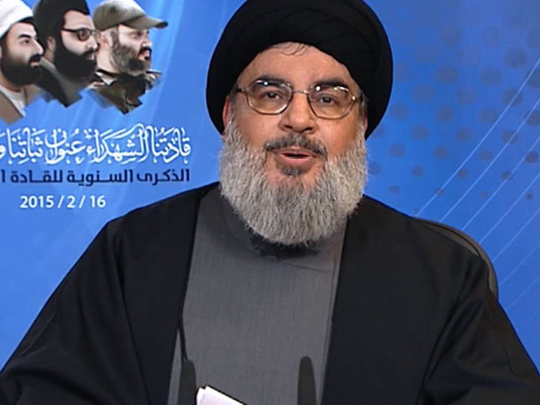
Beirut: The leader of Lebanon’s Hezbollah movement on Monday acknowledged for the first time that the Shiite militia has sent fighters to Iraq, and he urged Arab states throughout the region to set aside sectarian rivalries to confront the threat posed by Daesh. In a videotaped speech delivered to followers in Beirut’s southern suburbs, Hassan Nasrallah called on the region’s traditional American allies to abandon their reliance on the United States and instead align with Hezbollah - and by implication with its sponsor Iran - to defeat Daesh. “He who relies on the Americans relies on an illusion. You rely on someone who is stealing from you and conniving against you,” he said.
The speech was unusual in its scope, even for Nasrallah, who regularly delivers addresses in which he articulates his thoughts, typically with a focus on Lebanon and Hezbollah’s arch-enemy, Israel. In this instance, he portrayed Daesh as the most serious immediate threat to the region’s stability, although he also repeated the common charge that Daesh is working on Israel’s behalf.
He cited Iraq and Syria as evidence that Hezbollah and its allies are the only ones who are effectively fighting Daesh, and he described America’s response as too slow and insufficient.
“We won’t wait for the Americans nor will we wait for NATO. In Iraq, they didn’t wait,” he said, describing how local tribes and militias, which refer to themselves as popular committees, had taken up arms there to hold back the Daesh advance.
“Until now the Americans aren’t giving them arms,” he said. “All of the arms are coming from Iran.”
At a time when Iran-backed Shiite militias are leading the fight in Iraq against Daesh, as well as against the rebels in Syria, he appeared to be trying to cajole the Sunni Arab world into recognizing their ascendant role.
The plea also, however, appeared to be an acknowledgment that Hezbollah and its Iranian and Shiite allies can’t win the fight against Daesh unaided, said Nicholas Noe, a Beirut-based political analyst.
“He was acknowledging Hezbollah’s fundamental weakness right now, which is that we can’t resolve this on our own,” he said. “He was very much making it clear that if they stand alone, the region is never going to settle down.”
It has been known since late last year that Hezbollah had sent fighters to Iraq after a Hezbollah commander was killed north of Baghdad, but this was the first time Nasrallah has publicly admitted the group’s role there. He described Hezbollah’s presence as small and “in its earliest stages.”
He also said new volunteers were welcome.
“To those who call for Hezbollah’s withdrawal from Syria, I invite you to come with us to Syria . . . and I invite you to come with us to Iraq,” he said.
He opened his speech by condemning the beheading of 21 Egyptian Coptic Christians in Libya by Daesh, as shown in a video released on Sunday by the extremist group.












